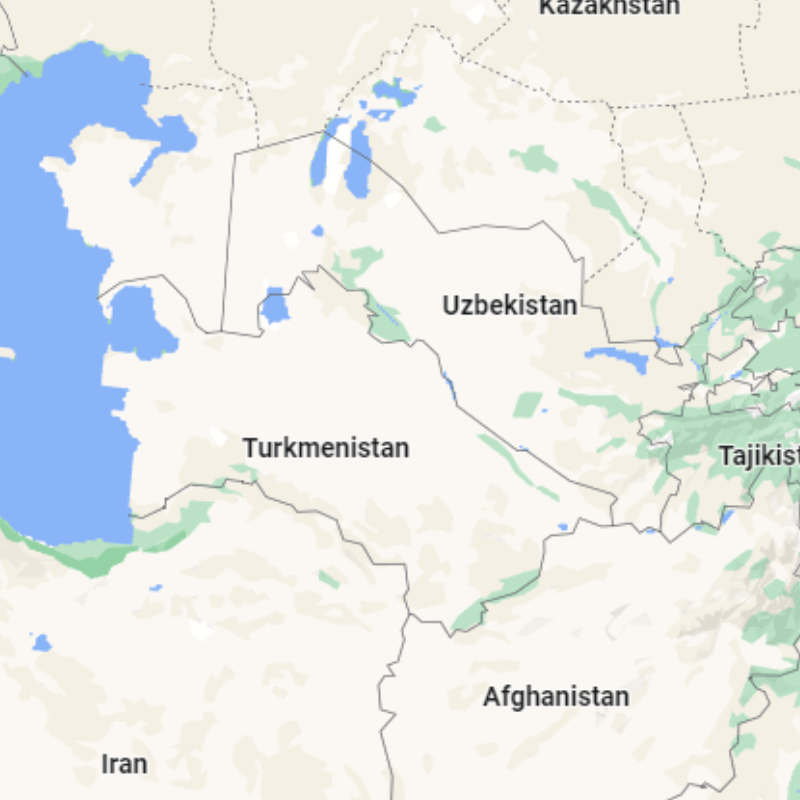Bilateral relations between India and Turkmenistan have seen steady progress over the last few years. Read further to know more.
Why in News?
At the invitation of Mr Serdar Gurbangulyyevich Berdimuhamedov, President of Turkmenistan, the President of the Republic of India, Shri Ram Nath Kovind paid a State visit to Turkmenistan on 1-4 April 2022.
This visit is significant as it is the first-ever visit by an Indian President to Turkmenistan.
Turkmenistan: Geographical Significance

Turkmenistan, one of the former USSR’s Republics, was proclaimed an independent State on 27 October 1991.
It shares borders with Kazakhstan in the north, Uzbekistan in the north and northeast, Iran in the South, and Afghanistan in the Southeast. It has an area of 488,100 square km and stretches 650 km from north to south and 1,100 km from east to west.
The main river of Turkmenistan is the Amu Darya, which enters the country from Afghanistan and flows along the northeastern borders before it enters Uzbekistan. The Karakum canal carries the waters of Amu Darya across the desert from the East to the West and is the main source of drinking water and irrigation.
Turkmenistan is mostly covered with desert (about 80%).
Some of the earliest cities in the world were developed here. The most interesting landmarks in Turkmenistan are the ruins of ancient cities and fortresses. Merv was one of the world’s largest ancient cities at the beginning of the 13th century and Urgench was a major centre of culture, influencing architecture and art in Central Asia.
Hundreds of hills and crumbling ruins all over the country testify that this country had a great and interesting path.
About India-Turkmenistan Relations
India enjoys close, friendly, and historical ties with Turkmenistan. ‘Turkman Gate’ built in Delhi in the 1650s bears testimony to this friendship. Archaeological finds in south Turkmenistan have revealed contacts with Indus Valley Civilization. India was one of the first countries to recognize Turkmenistan’s independence in 1991. Formal diplomatic relations were established in 1992. India considers Turkmenistan as part of her extended neighbourhood.
Areas of Engagement
- Political relations: India -Turkmenistan political relations have been warm and cordial. Institutional mechanisms between the two governments, namely Foreign Office Consultations (FOC) and the Inter-Governmental Commission (IGC) further bilateral cooperation.
- Education: India provides ITEC training for Turkmen nationals in India. India also providesICCR scholarships to students from Turkmenistan to persuade graduation,post-graduation, and Ph.D.
- Cultural relations: Hindi language is being taught to about 50 students each year at the Azadi Institute of
world languages in Ashgabat.’Vishwa Hindi Diwas is celebrated in Turkmenistan every year. Indian music also holds a place in the hearts of Turkmen people. - Trade: Total trade for the year 2017-18 stood at US$ 80.46 million. Of this, exports from India stood at US$54.31 million and imports by India at US$ 26.15 million with India registering a trade surplus of US$ 78.93 million in its favour. Major items of import from India include electronic and electrical items (LG products made in India), machinery and woven apparel and pharmaceuticals, frozen meat, and tyres. Exports to India comprise of raw hides and inorganic chemicals (e.g. Iodine).
Challenges in India-Turkmenistan Relations
- Connectivity concerns: Adverse geographic terrain and the thorny India-Pakistan border greatly impede connectivity, thereby curbing greater economic cooperation between India and the region.
- unrealized trade potential: factors such as trade regulatory hindrances and political fragility have often created obstacles to the free flow of trade.
- Security challenges: Radicalisation, Illegal migration, and trafficking in narcotic drugs and psychotropic substances are some of the security challenges.
Conclusion
Strengthening connectivity through initiatives like INSTC, and formalization of agreements pertaining to the TAPI gas pipeline are all avenues offering cooperation. Turkmenistan has further expressed interest in studying the possibility of joining the International Solar Alliance (ISA) and the Coalition of Disaster Resilient Infrastructure (CDRI). Based on values of trust and cooperation, the partnership between two nations allows opportunities to overtake others and go beyond bilateral relations.
Article written by: Vivek Rajasekharan







Leave a Reply